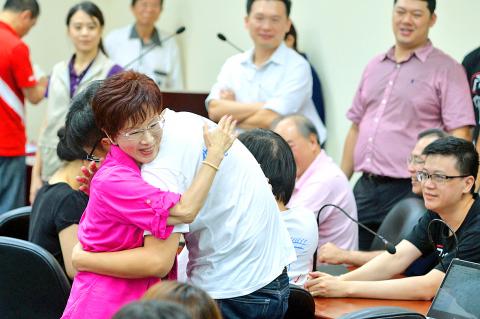Deputy Legislative Speaker Hung Hsiu-chu (洪秀柱) yesterday passed the 30 percent threshold in the Chinese Nationalist Party’s (KMT) three presidential primary polls yesterday, with an average approval rating of 46.203 percent.
Hung, who was the only contender, can now be nominated by the KMT to run in the presidential election in January next year.
She thanked her supporters during a news conference at the KMT’s headquarters in Taipei.

Photo: CNA
“This is only the first step,” Hung said, adding that she would move forward with greater confidence to secure the nomination.
Hung said she expects the KMT’s national party convention on Friday to formally pick her as the party’s presidential nominee and that a presidential election between two women would mark a new page in the development of democracy in Taiwan.
According to KMT sources, “hesitation and cowardice” by the so-called “KMT heavyweights” in failing to run in the primary drove party members to support Hung and helped her pass the primary poll threshold.
The polls were organized by three agencies — Trengo, Statinc and the United Daily News — each of which was required to collect more than 1,200 valid samples.
The polls measured Hung’s approval rating running alone and against Democratic Progressive Party Chairperson and presidential candidate Tsai Ing-wen (蔡英文). The final results were an average of the two scenarios in the three polls.
KMT Vice Chairman Hau Lung-bin (郝龍斌) yesterday said the high approval rating demonstrated that Hung had wide support among the public.
“Hung’s insistence on throwing her hat into the ring and her position on the future of our party has encouraged many supporters. We are proud of her,” Hau said.
Hau said he would convene a meeting of the nomination and auditing committee tomorrow to confirm the outcome of the polls before submitting the results to the KMT’s Central Standing Committee on Wednesday.
Hung yesterday said political views, professional ethics and age would be important considerations when selecting a running mate.
Hung added that she has a rough idea about who she wants as her vice presidential candidate, but declined to elaborate any further.
Hung, 67, said she expects her running mate to be younger than her, have the same political views, a positive moral character, impeccable professional ethics and a background that complements her own.
Meanwhile, KMT Chairman Eric Chu (朱立倫) said he is happy about the outcome of the primary and added that Hung’s nomination would be processed according to party rules.
According to Chu, Hung’s nomination would first be confirmed by the nomination committee and then submitted to the Central Standing Committee, which meets on Wednesdays, for approval.
President Ma Ying-jeou (馬英九) would fully support whichever candidate the KMT nominates to run in the next presidential election, Presidential Office spokesman Charles Chen (陳以信) said yesterday.
“As a member of the KMT, President Ma will extend his backing to the candidate nominated by the party,” Chen said.
If nominated by the KMT, Hung would run against Tsai, who lost the 2012 presidential race to Ma.

Intelligence agents have recorded 510,000 instances of “controversial information” being spread online by the Chinese Communist Party (CCP) so far this year, the National Security Bureau (NSB) said in a report yesterday, as it warned of artificial intelligence (AI) being employed to generate destabilizing misinformation. The bureau submitted a written report to the Legislative Yuan in preparation for National Security Bureau Director-General Tsai Ming-yen’s (蔡明彥) appearance before the Foreign Affairs and National Defense Committee today. The CCP has been using cognitive warfare to divide Taiwanese society by commenting on controversial issues such as Taiwan Semiconductor Manufacturing Co’s (TSMC, 台積電) investments in the

INVESTIGATION: The case is the latest instance of a DPP figure being implicated in an espionage network accused of allegedly leaking information to Chinese intelligence Democratic Progressive Party (DPP) member Ho Jen-chieh (何仁傑) was detained and held incommunicado yesterday on suspicion of spying for China during his tenure as assistant to then-minister of foreign affairs Joseph Wu (吳釗燮). The Taipei District Prosecutors’ Office said Ho was implicated during its investigation into alleged spying activities by former Presidential Office consultant Wu Shang-yu (吳尚雨). Prosecutors said there is reason to believe Ho breached the National Security Act (國家安全法) by leaking classified Ministry of Foreign Affairs information to Chinese intelligence. Following interrogation, prosecutors petitioned the Taipei District Court to detain Ho, citing concerns over potential collusion or tampering of evidence. The

‘COMPREHENSIVE PLAN’: Lin Chia-lung said that the government was ready to talk about a variety of issues, including investment in and purchases from the US The National Stabilization Fund (NSF) yesterday announced that it would step in to staunch stock market losses for the ninth time in the nation’s history. An NSF board meeting, originally scheduled for Monday next week, was moved to yesterday after stocks plummeted in the wake of US President Donald Trump’s announcement of 32 percent tariffs on Taiwan on Wednesday last week. Board members voted to support the stock market with the NT$500 billion (US$15.15 billion) fund, with injections of funds to begin as soon as today. The NSF in 2000 injected NT$120 billion to stabilize stocks, the most ever. The lowest amount it

NEGOTIATIONS: Taiwan has good relations with Washington and the outlook for the negotiations looks promising, Minister of Economic Affairs J.W. Kuo said Taiwan’s GDP growth this year is expected to decrease by 0.43 to 1.61 percentage points due to the effects of US tariffs, National Development Council (NDC) Minister Paul Liu (劉鏡清) said at a meeting of the legislature’s Economics Committee in Taipei yesterday, citing a preliminary estimate by a private research institution. Taiwan’s economy would be significantly affected by the 32 percent “reciprocal” tariffs slapped by the US, which took effect yesterday, Liu said, adding that GDP growth could fall below 3 percent and potentially even dip below 2 percent to 1.53 percent this year. The council has commissioned another institution